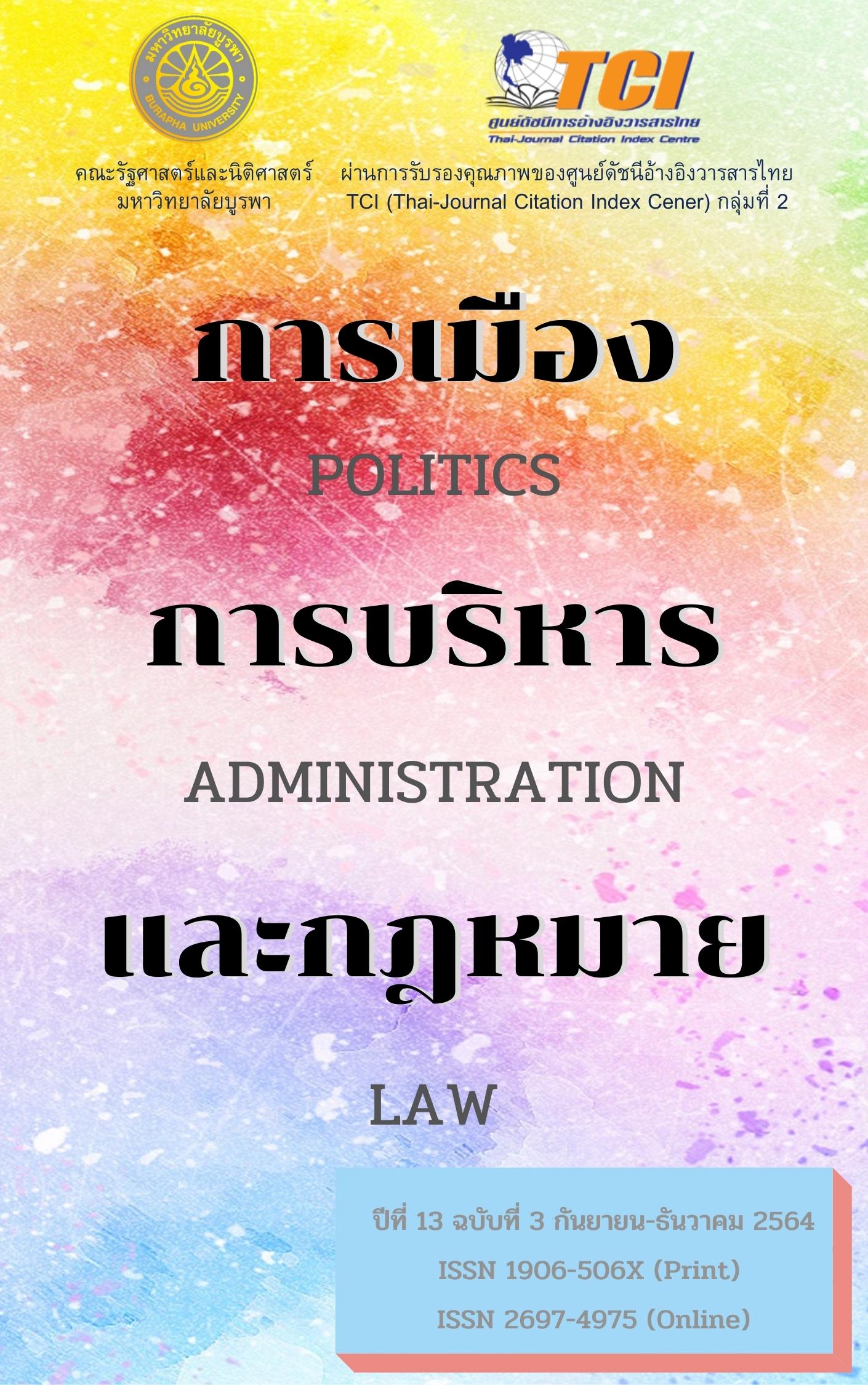The Deprivation of Political Rights and Criminal Punishment Through the Perspective of the European Court of Human Rights
Keywords:
Deprivation of political rights, Disqualified the right to be elected, Criminal Penalty, The constitutional court, The European court of human rightsAbstract
The deprivation of Political Rights measure, especially deprivation of the right to vote and to stand as a candidate at election measure is a measure that does not have a clear status yet which is a problem that has been debated whether it is a criminal law or not since there is an issue of retrospective enforcement by the Constitutional Court. These measures create a huge impact on people because they deprive rights and power of people under Democratic regime. Therefore, it is important whether the deprivation of Political Rights measure is a criminal offense and should be determined a status to set the regulation or not. European Court of Human Rights has been considered as a court that has rule status of the measures based on Human Rights Protection in many cases and release many noticeable rulings and criteria to be used to consider status of the measures which can be apply to determine status of plenty measures in Thailand. From the study, according to the European Court of Human Rights, the main factors that the court uses to consider status of the measures are enforcement purpose, condemnation, retribution, severity of measures, sources of measures and enforcement conditions. To consider the status of the deprivation of Political Rights measure together with these criteria, it shows that the European Court of Human Rights considers the status of the deprivation of Political Rights measure differently each case and each context which I found that there are some errors and mistakes from the trial of the European Court of Human Rights by using different criteria in each case. In my point of view, it is important to clearly specify which factors should be primarily taken to consider status of the measures which can be also called as a guideline. If the first criteria that should be taken cannot be clearly set, other factors will be consider accordingly. Otherwise, the consideration of status of the measures will only rely on context of each case. From my view, enforcement purpose, condemnation, retribution, severity of measures is the first group of criteria that shows the criminal offense characteristic. Also the deprivation of Political Rights measure, especially deprivation of the right to vote and to stand as a candidate at election measure have the characteristics of criminal punishment. Therefore, to enforce these measures is necessary to make it according to the principle of legality.
References
โกเมน ภัทรภิรมย์. (2524). คำอธิบายกฎหมายอาญาฝรั่งเศส. กรุงเทพฯ: คณะนิติศาสตร์ มหาลัยธรรมศาสตร์.
จิตติ ติงศภัทิย์. (2525). กฎหมายอาญา ภาค 1. กรุงเทพฯ: สำนักฝึกอบรมกฎหมายแห่งเนติบัณฑิตยสภา.
ฐากูร ศิริยุทธ์วัฒนา. (2562). กฎหมายรัฐธรรม: หลักพื้นฐานแห่งกฎหมายรัฐธรรมนูญและระบอบประชาธิปไตย (พิมพ์ครั้งที่ 3). กรุงเทพฯ: วิญญูชน.
ณรงค์ ใจหาญ. (2543). กฎหมายอาญาว่าด้วยโทษและวิธีการเพื่อความปลอดภัย. กรุงเทพฯ: วิญญูชน.
ทวีเกียรติ มีนะกนิษฐ. (2558). กฎหมายอาญาภาคทั่วไป. กรุงเทพฯ: วิญญูชน.
ปกป้อง ศรีสนิท. (2561). กฎหมายอาญาชั้นสูง (พิมพ์ครั้งที่ 2). กรุงเทพฯ: วิญญูชน.
ผจงจิตต์ อธิคมนันทะ. (2525). สังคมวิทยาว่าด้วยอาชญากรรมและการลงโทษ. กรุงเทพฯ: มหาวิทยาลัยรามคำแหง.
รณกรณ์ บุญมี. (2562). หลักประกันสิทธิของการบังคับใช้กฎหมายอาญาควรถูกนำไปใช้ในสภาพบังคับอื่นหรือนอกจากโทษอาญาหรือไม่ : ข้อพิจารณาตามหลักเกณฑ์ของศาลสิทธิมนุษยชนยุโรป. ในรวมบทความวิชาการเนื่องในโอกาส 60 ปี ศาสตราจารย์ ดร.สมคิด เลิศไพฑูรย์. กรุงเทพฯ: โรงพิมพ์เดือนตุลา.
สุรสิทธิ์ แสงวิโรจนพัฒน์. (2549). ระบบการลงโทษตามกฎหมายอาญาเยอรมัน ตอนที่ 1. ศาลยุติธรรม ปริทัศน์, 6, 76-118.
อภิรัตน์ เพ็ชรศิริ. (2548). ทฤษฎีอาญา. กรุงเทพฯ: วิญญูชน.
Guide on article 7 on the European Convention of Human Rights: No punishment without law.
Guide on article 6 on the European Convention of Human Rights: Right to fair trial.
Hasse, M. (1930). Civil Death in Modern Time: Reconsidering Felony Disenfranchisement in Minnesota. Minnesota Law Review, 99, 272.
Starkweather, D. A. (1992). The Retributive Theory of "Just Deserts" and Victim Participation in Plea Bargaining. Indian law Journal, 67(3), 853-878.
Study Case
Albanese v. Italy. ECHR 2006. Application No. 77924/01
Engel and Others v. the Netherlands. ECHR, 23 Nov. 1976. Application No. 5100/71; 5101/71; 5102/71; 5354/72; 5370/72
Labita v. Italy. ECHR 2000. Application No. 26772/95
Matyjek v. Poland. ECHR 2007. Application No. 38184/03
Paksas v. Lithuania. ECHR 2011. Application No. 34932/04.
Pierre Bloch v. France. ECHR 1997. 120/1996/732/938
Sobaci v. Turkey. ECHR 2007. Application No. 26733/02
Vito sante santoro v. Italy. ECHR 2004. Application No. 36681/97
Downloads
Published
Issue
Section
License

This work is licensed under a Creative Commons Attribution-NonCommercial-NoDerivatives 4.0 International License.






